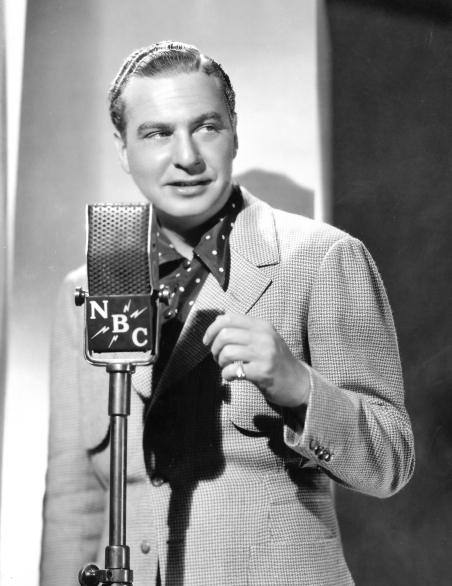Phil Harris: the Original Hipster
So, after going on and on about radio programs recently, I think I'll present you with a bit of a hybrid. Naturally, back there, you didn't just hear programs on the radio, you heard music. I present to you a man who did both. He was a comedian, a singer, a conductor, and an all-around wonderful man to be around. Ladies and gentlemen, Mr. Phil Harris.
 |
| Phil Harris seen here with two very good friends of his: Bing Crosby and Dean Martin. |
This isn't a spotlight post, so I'm not gonna go too in depth, but Phil Harris was a recording star in the 30s and 40s who made the bulk of his fame on the Jack Benny program (See previous blog post for more info), portraying a ladies man conductor who wasn't too bright. For 16 years, he'd bedazzle listening audiences with the orchestra, but very rarely did he himself sing on the show. In reality, Phil Harris was an accomplished musical star, and many of his songs rose to the top of the charts.
If you'll permit me to speculate, the Jack Benny Program's musical interludes were meant to appeal to the widest possible audience, that's why the singers on the show sang like opera stars. The music was kept purposefully easy listening and inoffensive. Phil Harris, conversely, had a comparatively out there style of singing, that may not have mixed well with the entire 1940s audience. In reality, it's that more out there style that made Phil Harris well remembered and made the likes of Dennis Day and Kenny Baker fade into obscurity, but I digress.
 |
| "Phil is the kinda guy you can trust with your best girl, if you can...trust your best girl," |
The musical stylings of Phil Harris appealed more to the younger audiences. His style of comedic tunes didn't mesh well with older audiences who preferred more poetic, meaningful lyrics. It was perhaps this younger audience, his style of singing (Which many consider to be a precursor to rap) and his overall modern outlook on social issues that earned him the nickname of a hipster. He would dress up in a tuxedo, pick up his conductor baton, and sing about a preacher who went hunting on Sunday and found a bear. He'd conclude such a rousing tale by saying the preacher's suspenders which he happened to be wearing knocked the bear 10 feet from where the scuffle occurred.
Take one of his biggest songs, "That's What I Like About the South," Every time Phil sang it, he seemed to add a different verse. This song was a running gag on the Jack Benny Program, as Jack notoriously disliked the song, especially a certain verse telling of a certain place by the name of "Do-Wah-Diddy," According to Phil, it was neither a town nor a city. In a TV special with the two of them, Jack pulled out a map of the United States and asked Phil to direct him to such a place. What follows is absolute hilarity,
 |
"I can see Walla Walla, Muskegon, Ashtabula, Waxahachie, but where in the name of Aristotle Onassis is Do-Wah-Diddy?" |
Phil Harris also had a radio program with his wife of over 50 years, Alice Faye. I haven't heard many episodes, but from what I can tell, it's a situation comedy show, like many others of the time. Phil's character is exactly the same as it was in the Jack Benny Program, and Alice adds a good foil, similar to Mary Livingstone. If you enjoy the character, I recommend it.
 |
| Phil and Alice seen here with their two daughters. |
I suppose I ought to end this here. I didn't want to talk about someone so specific, but like with everything I post about, I want, above all else, for you to do your own research and find what appeals to you. This is old and obscure now, but that's what I do this for, to show different sides of entertainment back there. Everyone's heard of Frank Sinatra or Nat King Cole, or Elvis, so here's a popular man from that same time, that you may have never even heard of.
Anyway, we're a little late, so good night, folks.
I hope to see you Back There.
Comments
Post a Comment